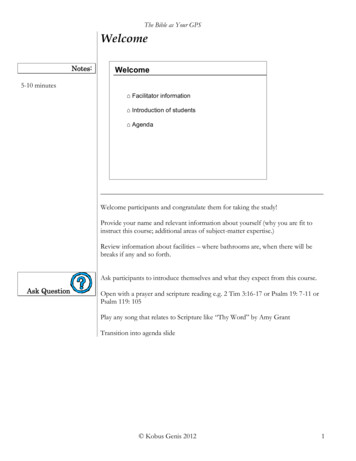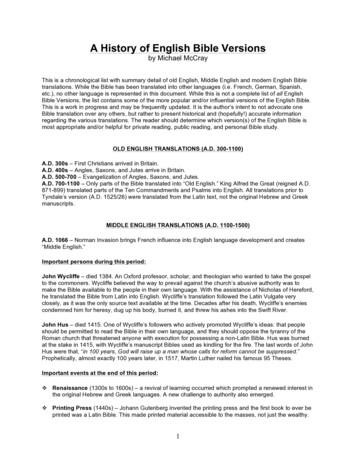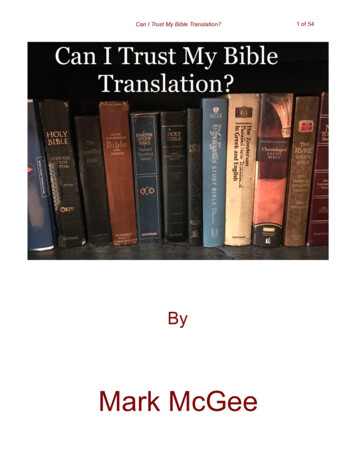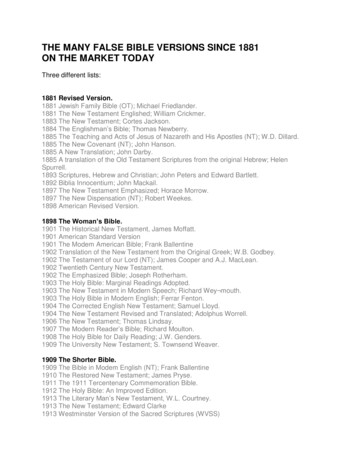
Transcription
Commentary onthe Letter to the RomansBible Study Notes and Commentsby David E. PratteAvailable in print atwww.gospelway.com/sales
Commentary on the Letter to the RomansBible Study Notes and Comments Copyright David E. Pratte, 2017All rights te carefully: No teaching in any of our materials isintended or should ever be construed to justify or to in anyway incite or encourage personal vengeance or physicalviolence against any person.Front Page PhotoThe Colosseum in Rome(Photo in the public domain)Other AcknowledgementsUnless otherwise indicated, Scripture quotations are generally from theNew King James Version (NKJV), copyright 1982, 1988 by Thomas Nelson,Inc. used by permission. All rights reserved.Scripture quotations marked (NASB) are from Holy Bible, NewAmerican Standard La Habra, CA: The Lockman Foundation, 1995.Scripture quotations marked (ESV) are from The Holy Bible, EnglishStandard Version, copyright 2001 by Crossway Bibles, a publishingministry of Good News Publishers. Used by permission. All rights reserved.Scripture quotations marked (MLV) are from Modern Literal Versionof The New Testament, Copyright 1999 by G. Allen Walker.Scripture quotations marked (RSV) are from the Revised StandardVersion of the Bible, copyright 1952 by the Division of Christian Education,National Council of the Churches of Christ in the United States of America.Scripture quotations marked (NIV) are from the New InternationalVersion of the Holy Bible, copyright 1978 by Zondervan Bible publishers,Grand Rapids, Michigan.Study Notes on RomansPage #2
Other Books by the AuthorTopical Bible StudiesGrowing a Godly Marriage & Raising Godly ChildrenWhy Believe in God, Jesus, and the Bible? (evidences)The God of the Bible (study of the Father, Son, and Holy Spirit)Grace, Faith, and Obedience: The Gospel or Calvinism?Kingdom of Christ: Future Millennium or Present Spiritual Reign?Do Not Sin Against the Child: Abortion, Unborn Life, & the BibleTrue Words of God: Bible Inspiration and PreservationCommentaries on Bible BooksGenesisJoshua and RuthJudges1 SamuelEzra, Nehemiah, and EstherJobProverbsGospel of MarkGospel of JohnActsRomansEphesiansPhilippians and ColossiansHebrews1 & 2 PeterBible Question Class BooksGenesisJoshua and RuthJudges1 SamuelEzra, Nehemiah, and EstherJobProverbsEcclesiastesIsaiahGospel of MatthewGospel of MarkGospel of LukeGospel of JohnActsRomans1 Corinthians2 Corinthians and GalatiansEphesians and PhilippiansColossians, 1&2 Thessalonians1 & 2 Timothy, Titus, PhilemonHebrewsGeneral Epistles (James – Jude)RevelationWorkbooks with Study NotesJesus Is Lord: Workbook on the Fundamentals of the Gospel of ChristFollowing Jesus: Workbook on DiscipleshipGod’s Eternal Purpose in Christ: Workbook on the Theme of the BibleVisit our website at www.gospelway.com/sales to see acurrent list of books in print.Page #3Study Notes on Romans
Other Resources from the AuthorPrinted books, booklets, and tracts available atwww.gospelway.com/salesFree Bible study articles online atwww.gospelway.comFree Bible courses online atwww.biblestudylessons.comFree class books atwww.biblestudylessons.com/classbooksFree commentaries on Bible books atwww.biblestudylessons.com/commentaryContact the author atwww.gospelway.com/commentsStudy Notes on RomansPage #4
Table of ContentsIntroduction to Romans. 8Part 1: An Explanation of Justification by Faith – Chapters 1-11. 13Romans 1 . 13Romans 2 . 63Romans 3 . 95Romans 4 . 117Romans 5 . 133Romans 6 . 149Romans 7. 163Romans 8 .181Romans 9 . 221Romans 10. 245Romans 11 . 264Part 2: Practical Applications of the Gospel – Chapter 12-16 . 292Romans 12 . 292Romans 13 . 315Romans 14 .330Romans 15 . 365Romans 16 . 380(Due to printer reformatting, the above numbers may be off a page or two.)Notes to the ReaderTo save space and for other reasons, I have chosen not to includethe Bible text in these notes (please use your Bible to follow along). WhenI do quote a Scripture, I generally quote the New King James Version,unless otherwise indicated. Often – especially when I do not usequotations marks – I am not quoting any translation but simplyparaphrasing the passage in my own words. Also, when I ask the readerto refer to a map, please consult the maps at the back of your Bible or ina Bible dictionary.You can find study questions to accompany these notes atwww.gospelway.com/salesTo join our mailing list to be informed of new books orspecial sales, contact the author atwww.gospelway.com/commentsPage #5Study Notes on Romans
Introductory Thoughts aboutCommentariesOnly the Scriptures provide an infallible, authoritatively inspiredrevelation of God’s will for man (2 Timothy 3:16,17). It follows that thiscommentary, like all commentaries, was written by an uninspired,fallible human. It is the author’s effort to share his insights about God’sword for the purpose of instructing and edifying others in the knowledgeand wisdom found in Scripture. It is simply another form of teaching,like public preaching, Bible class teaching, etc., except in written form(like tracts, Bible class literature, etc.). Nehemiah 8:8; Ephesians4:15,16; Romans 15:14; 1 Thessalonians 5:11; Hebrews 3:12-14; 5:12-14;10:23-25; Romans 10:17; Mark 16:15,16; Acts 8:4; 2 Timothy 2:2,24-26;4:2-4; 1 Peter 3:15.It follows that the student must read any commentary withdiscernment, realizing that any fallible teacher may err, whether he isteaching orally or in writing. So, the student must compare all spiritualteaching to the truth of God’s word (Acts 17:11). It may be wise to readseveral commentaries to consider alternative views on difficult points.But it is especially important to consider the reasons or evidence eachauthor gives for his views, then compare them to the Bible.For these reasons, the author urges the reader to alwaysconsider my comments in light of Scripture. Accept what Isay only if you find that it harmonizes with God’s word. Andplease do not cite my writings as authority, as though peopleshould accept anything I say as authoritative. Always let theBible be your authority.“He who glories, let him glory in the Lord”– 1 Corinthians 1:31Study Notes on RomansPage #6
Abbreviations Used in These NotesASV – American Standard Versionb/c/v – book, chapter, and verseESV – English Standard Versionf – the following verseff – the following versesKJV – King James VersionNASB – New American Standard BibleNEB – New English BibleNIV – New International VersionNKJV – New King James VersionRSV – Revised Standard VersionPage #7Study Notes on Romans
Introduction to RomansAuthorThe apostle Paul was the inspired author of this book – 1:1.Horne states: “ this Epistle has always been acknowledged to be agenuine and authentic production of Saint Paul ”Consider a few facts we know about Paul:* He was present at Stephen’s death (Acts 7).* He persecuted the church (compare 1 Timothy 1:12ff; Acts 8,9).* He was converted as a result of Jesus’ appearance to him on theroad to Damascus. Ananias was sent to baptize him (Acts 9,22,26).* He then preached in Damascus, then in Jerusalem, and later wenton three preaching trips, preaching even in Rome (Acts 9-26).* He especially preached to Gentiles and worked to prove that theyneed not be circumcised and obey the Old Testament to be saved (Acts15; Galatians, Romans)* He wrote more New Testament books than any other man.Date writtenIt was likely written in 57 or 58 AD, from Corinth. It was surelywritten before Paul visited Rome (1:10-15), so it had to be before hisprison epistles and before his trip to Rome as a prisoner. The connectionbetween Romans 15:25-27, 1 Corinthians 16:1-4, and 2 Corinthians 8&9implies it was written during Paul’s third preaching trip as he wastraveling to Jerusalem. This would make Romans one of the earlierepistles of the New Testament. Epistles that Paul wrote before Romansprobably include Galatians, 1 and 2 Thessalonians, and 1 and 2Corinthians.Horne states:“The most probable date is that which assigns this Epistle tothe end of 57, or the beginning of 58; at which time Saint Paul wasat Corinth, whence he was preparing to go to Jerusalem with thecollections which had been made by the Christians of Macedoniaand Achaia for their poor brethren in Judaea. (Rom. xv. 25—27.)”ThemeJustification for all men is through the gospel rather than throughworks of the Old Testament law.Romans is generally considered to be one of the most difficult NewTestament books to understand, mainly because it includes in-depthdiscussion of challenging issues about justification. It is meat, not milk.Study Notes on RomansPage #8
People addressedPaul addresses the church at Rome (1:7).The origin of the church in Rome is unknown. It may have beenbegun by Jews who came to Rome after Pentecost (Acts 2:10) or after thedispersion from Jerusalem (Acts 8:1ff). The church was composed ofGentiles (1:13; 11:13) and Jews (7:1; 2:17-29). This would lead toquestions about the Old Testament law and about how to treat oneanother in light of ancient animosities. Since Rome was the capital cityof the empire, the existence and strength of the church there would havespecial influence for God.Outline of the bookChapters 1-11 – Explanation of justification by faithAll people, Jew and Gentile, need the gospel – chapters 1-3.Introductory Remarks – 1:1-15The Gentiles, having rejected God, need the gospel – 1:16-32.The Jews, also having sinned, need the gospel – 2:1-29.All men have sinned and need the gospel – 3:1-31.Man’s need is met by faith in Christ under the gospel – chapters 4,5.Abraham demonstrates justification by faith apart from the law– chapter 4.Jesus’ death justifies man from sin – chapter 5.Jesus frees from the law, but requires obedience and spiritualmindedness – chapters 6-8.Grace forbids continuing in sin – chapter 6.Jesus freed us from the law – 7:1-6.The sinner struggled to keep the law – 7:7-25.The spiritual mind must overcome the fleshly mind – 8:1-18.God plans and provides for those He has forgiven – 8:19-39.God’s eternal purpose required using Israel– Chapter 9-11.God used Israel to accomplish His purposes – 9:1-21.The gospel offers salvation, but the Jews rejected it – 9:22-10:21.Israel yet had hope for the future – chapter 11Chapter 12-16 – Applications to personal livesGeneral practical admonitions – chapter 12Attitude and conduct toward civil government – 13:1-7Love for others and proper conduct in Jesus – 13:8-14Matters of liberty or personal conscience – 14:1-15:7Paul’s ministry among the Gentiles – 15:8-33Paul’s closing remarks and personal greetings – chapter 16Summary of key termsThe following terms are key to understanding the book. We willdefine and examine them before we begin the book. Since Romans is adifficult book, remember that none of its teachings will ever contradictthe simpler teachings found in other New Testament books.Page #9Study Notes on Romans
“Gospel”The gospel is the message of the good news of salvation throughJesus.Romans 1:16 – The gospel is the power of God unto salvation to allwho truly believe.Romans 10:14-17 – Faith in the gospel comes by hearing the wordof God, not by a blind “leap of faith” or by direct operation of the HolySpirit apart from the word.“Law”In Romans, “law” refers primarily to the Old Testament system ofcommands or rules. This is similar to the book of Galatians, so theteaching of Galatians (and other books) confirms and helps usunderstand the teaching of Romans.Romans 2:17-20,25; 10:5 – In order for one to be consideredrighteous before God under the law, he had to keep or do it. Note thatthe “law” here refers to the law that the Jews relied upon, includingcircumcision (2:17,25; compare 7:7). That law itself had a blessing onlyfor those who did everything it required without ever sinning (compareGalatians 3:10).Romans 3:19-23,28 – What the law could not do was justify sinners.Instead, it gave people the knowledge that they are all guilty of sin(verses 19,20,23). When people violated “the law,” it had no provision topermanently forgive (Hebrews 10:4). So what the law really did wasprove that all men are sinners, but then it could not justify them fromthose sins (compare Galatians 3:11,16,22). This showed how much weneed the sacrifice of Jesus that can forgive our sins.Romans 7:1-7 – Now that the gospel has come so we can be justifiedfrom sin through Jesus, we are no longer under the Old Testament. Weare dead to it (verse 4) and have been delivered from it (verse 6).(Compare 6:14f; Hebrews 10:1-10; 7:11-14; 8:6-13; 9:1-4; 2 Corinthians3:6-11; Galatians 3:24,25; 5:1-6; Ephesians 2:11-16; Colossians 2:13-17.)Note that, when Romans says we are not saved by “law” or “works,”it is talking about the works of the old law, which required sinlessperfection in order to have hope. We will see that it is not denying thatwe must obey the gospel in order to be forgiven by Jesus. The principlestaught apply to the Old Testament law, but the same conclusions wouldapply to any system of justification which, like the Old Testament, offersjustification only to those who sinlessly obey the commands (“works oflaw”), but then has no provision to permanently forgive violations.“Grace”Grace is undeserved favor by which God offers forgiveness to thosewho have violated His commands and therefore do not deserve Hisreward.Study Notes on RomansPage #10
Romans 5:1,2,20,21 – By God’s grace we rejoice in hope and receiverighteousness to eternal life through Christ. Since the old law couldnever justify from sins, everybody who violated it would standcondemned. One had to live a sinless life in order to have hope under“the law.” But the gospel provides the sacrifice of Jesus that can forgivesins. So we now have grace – favor with God that we do not deserve. Thisis the basic difference between “works of the law” and “grace throughfaith.” (Compare 3:23f; 4:4f; 6:14f; 11:6.)“Faith”Faith is belief and trust in Jesus and His gospel message.Romans 5:1 – We are justified by faith so we have peace with Godthrough Christ. Faith is essential to salvation (1:16: 3:22,25; 4:5,16,1925; 10:13-17) because, after man has sinned, he cannot earn salvation bya life of sinless law-keeping. So we need God’s unmerited favor to forgiveus through Jesus’ death. This requires us to trust Him since, by our ownefforts, we do not deserve eternal life.“Obedience”Obedience means keeping God’s commands or instructions. Somepeople claim Romans proves that, since people are saved by faith andgrace, obedience is not necessary. But note:Romans 2:5-11 – In order to receive eternal life, we must continuepatiently doing good.Romans 6:3,4,16-18 – To be set free from sin, we must obey fromthe heart the doctrine delivered to us.Romans teaches, as do many other Scriptures, that obedience to thegospel is essential to salvation (see also 1:5; 4:12; 16:26; 15:18). Thedifference between the gospel and “the law” is that the law required alifetime of sinless perfection, which would earn God’s favor. But thegospel offers forgiveness to those who have sinned and therefore cannever earn God’s favor. Yet, to receive the forgiveness offered by God’sgrace, the gospel requires as a necessary condition that each personrecommit himself to serving God obediently. Those who truly trust Godand appreciate His grace must willingly submit to His conditions, so theycan be saved. Note that these conditions include confession and baptism(10:9,10; 6:3,4).(See also Matthew 7:21-27; 22:36-39; John 14:15,21-24; Acts10:34,35; 2:38; 22:16; Hebrews 5:9; 10:39; 11:8,30; Galatians 5:6; 2Thessalonians 1:8,9; James 1:21-25; 2:14-26; Luke 6:46; 1 Peter 1:22,23;1 John 5:3; 2:3-6. See also other passages about the necessity ofbaptism.)Obedience to the gospel is essential, but it does not earn salvation.It is a necessary condition to receive forgiveness offered by God’s grace.Page #11Study Notes on Romans
Keep these teachings in mind, so we do not become confused whendealing with the deeper statements in Romans. Nothing here willcontradict these clear teachings of Scripture.A list of verses in Romans that show obedience is essential tosalvation or is included in salvation by faith.Many claim that Romans teaches salvation by faith only withoutobedience. This can be disproved by comparing the teaching to manyother passages in other books (see above). But the book of Romans itselfrepeatedly teaches that obedience is necessary to salvation and thatobedience is in fact an essential part of saving faith. Paul makes thisabsolutely clear in Romans even before he begins his discussion ofsalvation by faith apart from works of the law (Old Testament).Here is a list of passages in Romans that demonstrate the need forobedience:1:5 – Obedience to the faith2:2-11 – Judgment and eternal destinies will be determined on thebasis of “deeds” (“works”), practices, obedience as contrasted todisobedience.4:12 – We must walk in the steps of Abraham’s faith.6:3-7 – Baptism puts us into Christ, into his death, to walk innewness of life, so we are freed from sin.Chapter 6 – Baptism must lead us to not return to sin.6:16-18 – We present ourselves as instruments of righteousness andare made free from sin when we obey from the heart the doctrinedelivered.8:1-13 – In order to be free from condemnation, so we livespiritually and do not die, we must “walk” (live) according to the spirit,not according to the flesh.10:9,10 – Confession with the mouth (an outward act of obedience),in addition to faith, is necessary to salvation.(16:26; 15:18)For further discussion of the role of obedience, faith,grace, and law in our salvation, see articles on these y.com/instruct/.Note that the book of Romans is often erroneously cited as evidencefor various Calvinistic doctrines, besides salvation by faith only. We willdiscuss many of these concepts at the appropriate points in the book.This will especially include discussions of election and predestination, aswell as inherited depravity and once saved, always saved. For furtherdiscussion of the tenets of Calvinism, see also our articles onthese subjects on our Bible Instruction web site atwww.gospelway.com/instruct/.Study Notes on RomansPage #12
Part 1: An Explanation ofJustification by Faith –Chapters 1-11Romans 1Chapters 1-3 – All People, Jew andGentile, Need the Gospel.1:1-15 – Introductory Remarks1:1,2 – Paul was a servant of Christ, called to be an apostleseparated to the gospel that God promised through theOld Testament prophets.Paul, a bondservant of Jesus ChristAs in nearly all his epistles, Paul identified himself from the outsetas the author. He also described his role in God’s plan.He was a servant or bondservant of Christ. All Christians areservants of Christ, because He is our Lord and Master. As His disciples,we must obey Him by submitting our will to His (Luke 6:46). Thisrequires obedience. Paul was no different from us in this regard; we areall servants of Christ. His role as an apostle and an author of many booksof the New Testament did not change his responsibility to serve God byfaithful obedience. In this we are all equal.Page #13Study Notes on Romans
Called to be an apostleHe was also called as an apostle. Compare Galatians 1:1,15 – Inmany of his epistles Paul affirmed he had been “called to be an apostle,”not by men, but by Jesus Christ (1 Corinthians 1:1).Many people doubted Paul’s apostleship, since he was not amongthe original apostles. So, he often asserted it in his writings, remindingpeople that he did speak with authority of one who was revealing God’scommands directly from the Holy Spirit.“Apostle” ( ) – “1. a delegate, messenger, one sentforth with orders 2. Specially applied to the twelve discipleswhom Christ selected, out of the multitude of his adherents, to behis constant companions and the heralds to proclaim to men thekingdom of God With these apostles Paul claimed equality ” –Grimm-Wilke-Thayer.Apostles were especially chosen and called personally by Jesus tobe apostles.Apostleship was not something one could take upon himself, norwas it something that just anyone could obtain by choosing to meetcertain requirements (as one can choose to become a Christian). One hadto be selected by Christ, and Christ Himself had to directly reveal eachman whom He individually selected.Luke 6:12-16 – Jesus personally chose 12 men and named them tobe apostles.Acts 1:24 – When one was chosen to take Judas’ place and benumbered among the 12, God indicated which man He had chosen tofill the office. (Compare John 15:27; Acts 10:40,41.)In particular, Paul was personally chosen and called by Jesus to bean apostle.Acts 26:16; 9:15 – Jesus said He appeared to Paul to make him aminister and witness of what he had seen (Acts 22:14,15). Jesuspersonally appeared to Paul, then told Ananias to teach and baptize himbecause Paul was “a chosen vessel” to preach Jesus’ name to Gentiles,etc.Apostles had to be eyewitnesses of the resurrected Christ.Acts 1:15-26 (especially verses 21,22) – The one chosen to replaceJudas had to be an eyewitness. Apostles repeatedly affirmed that theywere eyewitnesses – Acts 2:32; 10:41; 3:15; 1 John 1:1-4; etc.Paul also possessed this qualification.Acts 22:3-16; 26:16 (especially verses 14,15) – Paul saw and heardJesus so he could be a witness. Jesus said he appeared to Paul to makehim a witness. Though the time at which Paul became a witness wasexceptional, still he was just as qualified to do this job as were otherapostles (Acts 9:1; 1 Corinthians 15:4-8; 9:1-5).Apostles were empowered by the Spirit to do miraculous signs toconfirm to others that they were inspired by the Spirit.Study Notes on RomansPage #14
Matthew 10:1-4 – Jesus gave the 12 power to perform miracles(Hebrews 2:3,4).Mark 16:14,20 – As they preached, apostles confirmed the word bymiracles.The Bible contains many examples showing that the apostlesperformed such miracles – Acts 3:1-10; 8:14-24; 9:32-41; etc.Paul also was empowered to do miraculous signs.2 Corinthians 12:12 – He accomplished the signs of an apostleamong the Corinthians.Luke records many signs performed by the Spirit through Paul –Acts 14:8-10; 19:1-7; 20:8-12; 16:16-18; Romans 15:19.Apostles could lay hands on others and bestow on them the powerto do miracles.Acts 8:14-21 – Apostles went from Jerusalem to Samaria to layhands on Christians there and give them the Holy Spirit.Paul could lay hands on others and bestow miraculous powers onthem.Acts 19:6,7 – He laid hands on 12 disciples so the Holy Spirit cameon them and they spoke in tongues and prophesied.2 Timothy 1:6 – He gave Timothy a gift through the laying on of hishands (Romans 1:11).2 Corinthians 11:5; 12:11 – For all the reasons we have listed, Paulclaimed apostleship fully and equally with the other apostles (1Corinthians 9:1-5; Romans 1:1; 1 Corinthians 1:1; 2 Corinthians 1:1;Galatians 1:1; etc.).For further discussion of the role of apostles in thepurpose of the Holy Spirit, see articles on miracles and directrevelation for today on our Bible Instruction web site atwww.gospelway.com/instruct/.Separated to the gospel of GodAll of us are separated to the gospel in the sense that we arepurchased by the blood of Christ to be His followers. This makes ussanctified or holy – set apart from the world. We do not live by theworld’s standards but according to the teaching of the Lord Himself. Seeverse 7; compare 1 Peter 1:13-19.However, Paul was separated in a special sense in that he was calledto the work of preaching and teaching the gospel around the world. Hehad a special duty as a preacher and an apostle. See Acts 9:15; 13:2;Galatians 1:15.Note that this separation to the gospel did not give Paul or anyapostle the right to decide for themselves what they would preach. Theydid not invent the rules they revealed according to their own humanwisdom. Rather, they were empowered only to preach and teach themessage God revealed to them.Page #15Study Notes on Romans
An introduction to the gospelHere Paul for the first time mentions a major theme of the book: thegospel. The gospel is the message of the good news of salvation throughJesus. This message is the power of God to save those who hear it (10:1417), believe it (1:16), and obey it (16:25f). We will read much about thegospel as we proceed through the book.See also Mark 1:14; 16:15; Romans 15:16; 1 Corinthians 15:1-4; 2Corinthians 2:12; 11:7; 1 Thessalonians 2:2,8,9; 1 Peter 4:17.“Gospel” ( ) – “ 1. a reward for good tidings 2.good tidings In the N.T. spec. a. the glad tidings of the kingdomof God soon to be set up, and subsequently also of Jesus, theMessiah, the founder of this kingdom the glad tidings ofsalvation through Christ; the proclamation of the grace of Godmanifested and pledged in Christ; the gospel b. As the Messianicrank of Jesus was proved by his words, his deeds, and his death,the narrative of the sayings, deeds, and death of Jesus Christ ” –Grimm-Wilke-Thayer.Promised before through the prophets in the ScripturesThe gospel was not, as some think, an unexpected change in God’splan. Rather, God had planned from eternity that He would save men bythe death of Jesus, and that the message about this salvation would bepreached in the gospel. The prophets of the Old Testament had promisedthis. The fact that Jesus and the gospel fulfilled Old Testament prophecyshould compel anyone who believed the Old Testament to also believethe gospel.This gospel was promised when God said to Abraham that in hisseed all nations of the earth would be blessed – Genesis 12:3; 18:18;22:18; 26:4; 28:14. This was fulfilled in that Jesus was born as anIsraelite who brought the blessing of salvation from sin for people of allnations – Galatians 3:8; Acts 3:25,26.Other prophecies also predicted the gospel and its provisions:* Jeremiah 31:31,32 compare Hebrews 8:6-12; 10:1-4,9,10,14-18* Isaiah 2:2-4; 11:1,6-10 compare Luke 24:47; Mark 16:15,16;Romans 15:12-16* Romans 16:25,26; Ephesians 3:3-6(Compare Ephesians 3:3-11; 1 Peter 1:9-12; Luke 1:69,70; Romans3:21.)The fact that the gospel was promised and predicted in the OldTestament will become another common topic in Romans. Note how,even in his introduction, Paul is introducing the main themes of thebook.Study Notes on RomansPage #16
1:3,4 – Jesus was born of the seed of David, declared to beGod’s Son with power by the resurrection from the dead.Jesus was God’s Son, born a physical descendant of DavidSome say “concerning” refers back to the gospel (verse 1) whichconcerns the Son. Others say it refers back to the promise (verse 2) madebefore by the prophets. Either way, the point is the same, since the gospelis that which was promised in the Scriptures (see verse 2 above).The gospel that was promised is a message about Jesus who wasChrist (the anointed One) and Lord (Ruler) of God’s people, because Hewas the Son of God. This is, of course, a central theme of the gospel.Jesus was born in the flesh, but was not just a man. He was the very Sonof God, Deity by eternal nature. See John 1:1-3,14; 20:28; Colossians 2:9;Hebrews 1:2,8,9; Philippians 2:5-8.Yet, this verse affirms, as elsewhere in Scripture, that the Son of Godcame to earth in the flesh as a man (John 1:14; Hebrews 2:9-14;Philippians 2:5-8). In particular, he was born of the seed of David – i.e.,He was a descendant of David, just as the Old Testament had predicted.As the seed of David, He had the right to rule on the throne of David asthe Messiah, the Christ, the anointed Ruler of God’s people.Note that this was true “according to the flesh” – that is, He was adescendant of David as a man in His physical birth or ancestry. We willsee in the next verse that His spirit had existed from eternity. Thateternal spirit was embodied in human flesh, but He was the descendantof David only as regards the flesh.See also Matthew 1:1; 2 Samuel 7:12-16; Psa 89:3,4; 132:11; Isaiah9:6,7; 11:1; Luke 1:32,69; John 7:42; Acts 13:22,23; Revelation 22:16.Declared to be the Son of God with powerIn contrast to his physical ancestry as the descendant of David,Jesus was more than that: He was the Son of God. He was Deity frometernity, Divine in His essential nature. See references on verse 3 above.This truth was declared with power. It was powerfully preachedwhenever the gospel was preached (compare Acts 9:20; 2:36; 13:33).This declaration was that He is the Son of God according to the Spirit ofholiness.“Spirit of holiness” could refer to the Holy Spirit, who declared Himto be the Son of God by revealing and insp
Free Bible study articles online at www.gospelway.com . the Bible text in these notes (please use your Bible to follow along). When . please consult the maps at the back of your Bible or in a Bible dictionary.










